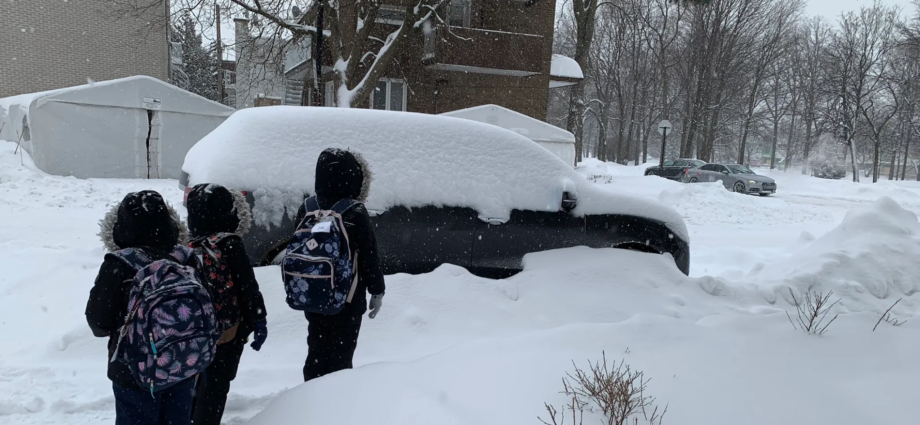
Safeera Jaffer, McGill University and R. Nanre Nafziger, McGill University
February 3, 2024
The doors of around 800 Québec public schools were closed due to the strike action of the Fédération autonome de l’enseignement (FAE) from Nov. 23 through Jan. 8.
During this strike period, 368,000 students missed 22 days of school while teachers also lost the same number of days in pay.
Additionally, teachers in unions represented by the Common Front were on strike for 11 days.
The strikes impacted public school teachers, students and parents across Québec at multiple levels including primary, secondary and adult education.
The consequences both in the short- and long-term are potentially devastating. The strike offers lessons about the urgent need to support teachers and address issues in public education.
Failing to do so will continue to negatively affect teacher morale, burnout and attrition. It will also risk further corroding the critical role of public schooling in supporting our communities.
Understanding demands, uplifting teacher voices
The demands of the FAE were extended beyond pay, including better recognition (including improved pension plans and parental rights), better family-work-life balance, better class composition, a reduction in the workload, new provisions regarding grievances and arbitration, better treatment of teachers with precarious status and a healthy workplace.
These demands cover finances, classroom practices and teacher well-being.
Given the current social and educational climate, including post-pandemic educational challenges, supporting teachers and policy changes is of the utmost importance.
Mitigating current challenges by accepting teacher demands is crucial because healthy and well-supported teachers are paramount for successful student learning.
The role of teacher well-being is particularly critical due to the continuing impacts of the COVID-19 pandemic in Canada.
Must change systemic problems
The lack of resources and support that teachers receive can lead to several consequences, ranging from increased stress and exhaustion to burnout.
While teachers are proven to be resilient in the face of these challenges, the concept of resilience itself is a contested one.
Teachers should not need to be resilient because of policies and practices that do not provide a healthy, positive working environment.
Asking teachers to endure sub-optimal working conditions shifts the burden of addressing structural and systemic issues away from governmental responsibility for public education reforms.
It also places an undue strain on the relationships between teachers, students and parents, whose interests should be aligned. There is a clear relationship between student and teacher well-being. When the well-being of teachers is prioritized, students’ work and learning flourishes in schools.
Serious attrition rates
The prolonged strike and the unwillingness of the government to address union demands in a timely manner may have further reduced teacher morale. It may also exacerbate the already high teacher attrition rates in Québec.
In fact, it points to the lack of concern for teachers who cite psychological and interpersonal reasons for leaving their roles.
Through policy and practice, teachers need to be valued as essential workers in education. Priority needs to be placed on not just bringing new professionals to the field, but keeping them.
Consequences for students, families
The prolonged strike will not just impact teacher morale: students will also bear the long-term consequences.
Students will have experienced learning loss, the stalling of academic gains, and social and psychological disruptions.
Although the Québec government has allocated $300 million on a catch-up plan designed to help students who have fallen behind with free tutoring and summer camps for high schoolers who are at risk of dropping out, the reverberations of the strike will last for years to come.
Studies have demonstrated that strike actions impact educational achievements and even employment and labour market earnings.
Parents and families, especially mothers, will be impacted financially.
Uneven effects
We must also consider larger connections between this educational labour issue and class struggles because the impacts of the strikes are certainly uneven. Hundreds of thousands of students in the public system will be racing to catch up on missed time while students in private schools did not miss a day.
These students will compete on the same ministerial examinations and for places at CEGEPs — colleges in Québec offering the first level of post-secondary education — which have become increasingly competitive.
During the strike, parents and caregivers were forced to manage child care alongside their own daily responsibilities, and many did not have the financial means for private tutoring or other ways to supplement learning loss.
Teachers from various backgrounds and economic statuses were also unpaid during this time; an unexpected loss of income can drastically influence one’s livelihood.
Deeper reflection needed
The strike is indicative of deeply entrenched problems in Québec’s public schools and reverberates with problems seen across the country.
Now that these strike actions are over, an opening is created for deeper reflection and work on transforming education and restoring the teaching profession to one that is highly valued and respected.
The success of students, the education system and the future of our communities depend on the learning that children receive in schools today.
Safeera Jaffer, Research Assistant, Department of Integrated Studies in Education, McGill University and R. Nanre Nafziger, Assistant Professor, African/Black Studies in Education, McGill University
Subscribe to our newsletter.
This article is republished from The Conversation under a Creative Commons license. Read the original article.


